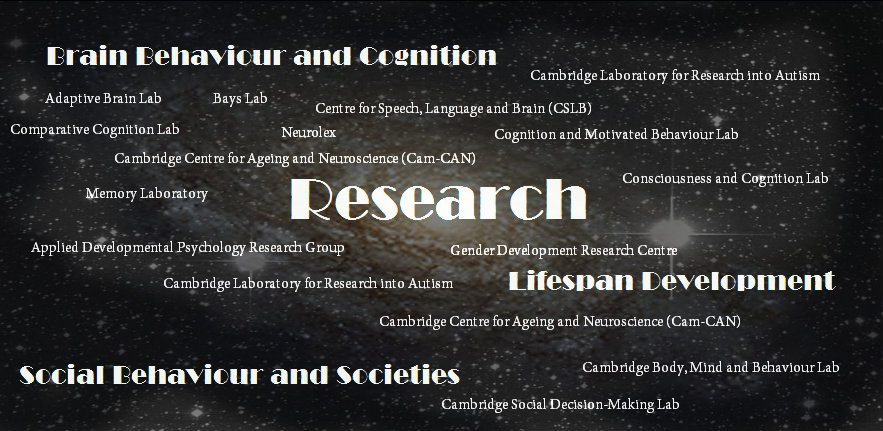University of Cambridge’s Student Wellbeing pages |
Postgraduate wellbeing service |
Students' Unions' Advice Service |
Department of Psychology
Postgraduate Wellbeing Service, Conflict and Difficulties
We hope that all students enjoy a happy and productive time in the Department and have a rewarding relationship with their supervisors. However, from time to time difficulties can arise and it is important for you to know there is someone to turn to. Your first port of call if you have difficulties with your Supervisor should be your Academic Advisor, whom you can approach and discuss any difficulties with in strict confidence.
The Student Wellbeing Service specialises in psychological wellbeing support for taught and research postgraduates. The service offers online and in-person appointments and is available through the academic year, including the summer months. Postgraduates can self-refer for an initial appointment. This new service is located within the University's Student Support Department, at the Student Services Centre.
We work collaboratively with postgraduates on mental health and wellbeing areas including:
- exploring support options and resources with a consultation appointment
- support with challenges which may be impacting on their life, studies or research
- applying evidence-based strategies for maintaining or improving mental health and wellbeing
- managing low mood, stress and anxiety, overcoming perfectionism or procrastination
If you are feeling that your mental health is at a breaking point, you may be experiencing a mental health crisis. Whatever the situation, if you feel you are experiencing a mental health crisis, seek help immediately by:
|
During the day, in office hours, speaking to your Tutor, your College Nurse, booking an emergency same-day appointment with your GP. The University Counselling Service also lists other useful contacts for immediate assistance. At night, or outside of office hours, going to your College Porters’ Lodge and explaining how you are feeling or calling the NHS First Response service by dialling 111 and selecting option 2. |
Working hours and work-life balance
While there may be a temptation to spend all of your working hours in the lab, a work-life balance is essential to your wellbeing and health. A report from the Cambridge Graduate Union highlighted, among other issues, holiday entitlement. To be clear, all students on courses lasting a year or more are entitled to take up to 8 weeks holiday each year. In addition, full-time students should not be expected to work more than 40 hours per week (and part-time students 20 hours per week). It is Department policy that you are not expected to read or respond to emails outside of your working hours. Regular breaks are important to help you recharge and a period away from the lab can often help you see your research in a new light. If you experience any difficulties with your supervisor in terms of holidays or working hours, please contact your Academic Advisor or the Director of Postgraduate Education as soon as possible.
Maternity and Paternity Policies
The Department of Psychology’s maternity policy for postgraduate students brings together resources from across the University and provides links to the maternity and paternity policies of our most frequent funders. It is aimed at guiding supervisors through the process and can be used as a checklist for supervisors and their students to work through together.
⤓ Guidance for supervisors/PIs: Maternity procedure for postgraduate students (Members only)
Experiencing problems?
Any student who experiences problems that are not dealt with satisfactorily by the Supervisor or Academic Advisor can bring them to the attention of the Director of Postgraduate Education or Postgraduate Administrator. If a student would prefer to talk to a peer first, they can reach out to their postgraduate rep Emily Towner or Nicole Tan If there are matters where the student would rather speak directly to the Head of Department, then he/she is encouraged to do so. Any issues may be discussed in confidence with the Director or Head of Department and, if necessary, the problems can be brought to the attention of the full Postgraduate Education Committee, which has overall responsibility for postgraduate student matters in the Department. You may also approach, in confidence, the Department Postgraduate Mentors (Greg Davis or Stephanie Archer). Whatever route you choose within the Department to address any difficulties, please be assured that any discussions you have will be treated as confidential and no action will be taken without your consent. Finally, you may of course approach your College Postgraduate Tutor about any issues affecting you or your studies.
Should you be dissatisfied with the outcome of any issue you raise, please note that the Postgraduate School of the Life Sciences also has a formal mediation procedure. If you feel that your concerns have not been adequately dealt with by the above routes, an additional resource provides an opportunity to register any issues anonymously.
It is important for you to deal with any issues that arise as quickly as possible. Whether these relate to your relationship with your supervisor or anyone else in the department, or if you should become ill, please do not let matters fester. It can be difficult enough doing a research project without the added burden of worries preying on your mind. It is important to know that the University and the Department operate a zero-tolerance policy in terms of bullying, harassment or sexual misconduct. Advice on any of these matters is available via the University website.
You can report inappropriate behaviour of other students and staff either anonymously or with your contact details via Report+Support. If you make a report with your contact details, a member of OSCCA (Office of Student Conduct, Complaints and Appeals) will contact you within 5 working days to discuss the next steps,
Illness, injury or other challenges
Should you become ill, injured or suffer any other changes in your personal circumstances that may affect your ability to carry out your research you should obviously discuss this with your Supervisor and Academic Advisor. It will also be helpful for you to contact your College postgraduate tutor to keep the College informed. There are a number of measures that can be taken to help you, including providing a period of intermission so that absence from the laboratory is not counted towards your PhD time. Invariably, such measures can be difficult to apply retrospectively so it is important you make us aware of any difficulties as quickly as possible. You can apply for intermissions via your CamSIS self-service pages.
Financial difficulties
Should you get into financial difficulties during your studies, please discuss this with your Supervisor and College graduate tutor, as they may be able to help. The University has a limited Hardship Fund for postgraduate students that you may be eligible to apply for. Details and application procedures are available from the Student Registry web site.







